This article summarizes 12 outstanding talents in the field of cryptocurrency, who will lead the development direction of the cryptocurrency industry in 2024.
Author: David Hoffman, Co-founder of Bankless
Translator: xiaozou, Golden Finance
1. Founder of EigenLayer, Sreeram Kanan
Founder of EigenLayer, the father of modern restaking, and a beloved philosopher of large-scale coordination.
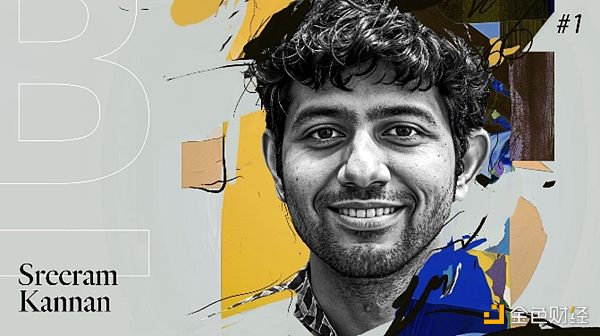
Sreeram Kannan lives in the future, a future I want to live in. His vision for EigenLayer to enable flexible large-scale coordination for humanity is a breath of fresh air in an industry that often seems directionless.
His clear thinking, linking technical details with abstract principles of trust and coordination, has garnered significant attention for him and EigenLayer, making it the next focus of Ethereum scalability—until EigenLayer introduced the concept of restaking, which made us realize its existence!
As the most important parts of the Ethereum roadmap draw closer, restaking has become the core narrative of Ethereum in 2024.
With the upcoming launch of the EigenLayer mainnet, the new AVS architecture, and the development of the restaking market, you will hear increasingly high waves of excitement from the Ethereum community and the broader cryptocurrency industry. However, there is a big question: Can "trust-as-a-service" penetrate non-cryptocurrency use cases of non-cryptocurrency tech companies?
2. Founder of Celestia, Nick White
Founder of Celestia, data provider, modular maximalist, minimalist monolith.
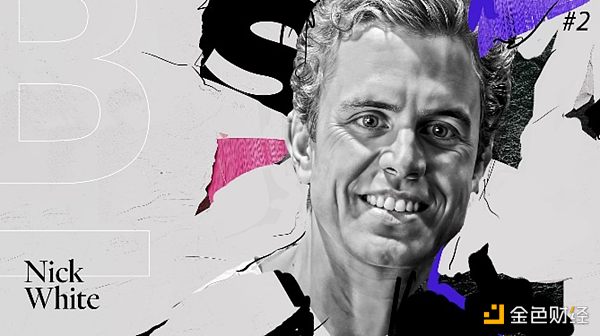
Nick White is driving the forefront development of modularity in the cryptocurrency space. How modular can the cryptocurrency space be? The core of modularity has characteristics highly resonant with cryptographic technology: antifragility, redundancy, replicability, expressiveness, and more. The Celestia project has become a watershed for investment in modular concepts.
Supporters of modularity believe that Celestia represents an explosion of innovation in the modular ecosystem. Is low-cost DA (data availability) really the missing piece of modular theory? What kind of asset is TIA? Does Celestia DA enable more rollups for Ethereum, which are crucial for Ethereum's long-term development… or is it a Trojan horse mechanism guiding Celestia's own ecosystem based on rollup? Is TIA money?
3. Founder of Eclipse, Neel Somani
Founder of Eclipse, producer of the platypus project, active participant in various ecosystems, walker between flyers.

Neel Somani is advancing the development of a new field he discovered from first principles. After building a Rollup-as-a-Service provider and pivoting to Eclipse, his story of how to ultimately define Eclipse provides us with rich knowledge.
The extreme is usually not the most ideal place to stand, and Neel has found a middle ground in 2024 between many leading projects—Ethereum, L2, Solana, and Celestia.
With the development of the SVM ecosystem, the success of Eclipse becomes more imaginable. Does the SVM viewpoint on Ethereum hold water? As Solana maximalists and modular maximalists move further apart, can Eclipse form an oasis between the two?
As Eclipse prepares to launch its mainnet, we will see what value a monolithic L2 on highly secure Ethereum L1 will bring to the world.
Whatever happens, Neel will teach us a lot on this journey.
4. Founder of Monad, Keone Hon
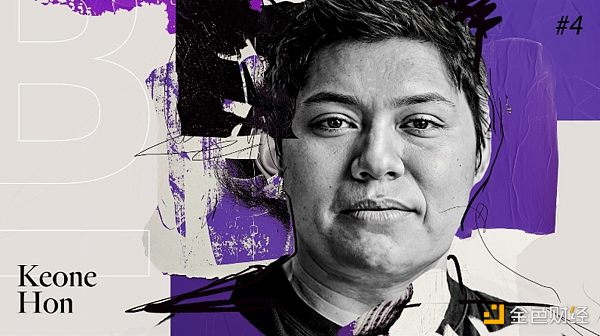
Founder of Monad, father of Molandack, EVM parallelism advocate, database parallelism advocate, I/O parallelism advocate.
Keone has become a prominent figure in the Monad project, which is dedicated to bringing parallelism to the EVM ecosystem. "The speed and low cost features of Solana, combined with the network effect of Ethereum," has formed a narrative.
Some experts point out that parallelizing just a virtual machine is not a breakthrough; what actually needs to be parallelized is database access. Keone and the Monad team have already done this, which is why MonadDB is a key part of Monad's innovation.
The 2024 release of Monad has been highly anticipated—just look at the high activity of all Nads (Monad supporters) in the #TheRoom channel on the Monad discord. People have started paying attention to this project, trying to find treasure between the two worlds of Ethereum and Solana.
5. Founder of Conduit, Andrew Huang
Founder of Conduit, gardeners of chains, tillers of transaction volume, cost reducers, framework copy-pasters, people at the bottom of the basin.

Andrew Huang is leading the charge in reducing the cost of deploying new rollup chains. All costs. Thanks to Andrew and Conduit, resource expenditure costs, technical complexity, and most other barriers have been eliminated. If you think rollups on Ethereum will be as numerous as blogs on the internet, then you are supporting Andrew.
Conduit is a Rollup-as-a-Service (RaaS) provider—think Cloud for Rollups. The economies of scale of RaaS are enormous. Lowering the resource costs of rollups means more applications can develop into application chains, and all Conduit-compatible chains will automatically gain first-class rollup security. As the Ethereum roadmap becomes increasingly centered on rollups, Andrew, Conduit, and other RaaS projects will be at the forefront of the fertile garden that the roadmap brings for rollups.
Finally, I hope Andrew can break the imaginary boundaries of rollups. Currently, we generally consider rollups to be faster and cheaper blockchains. I think this is an overly simplistic and unimaginative view of the future of rollups. Lowering the cost of rollups will not only make them faster and cheaper, but will also open up a whole new design space for rollups.
I'll be watching Andrew as he turns the two-dimensional world of rollups into a three-dimensional world.
6. Chief Strategy Officer of Espresso, Jill Gunter
Chief Strategy Officer of Espresso, L2 transaction pioneer, composability evangelist, chain abstractor, history anecdote expert.

In my impression, Jill Gunter has always been a low-key force in the cryptocurrency space. She joined Espresso Systems as CSO in 2021.
Espresso sits at the highly permeable boundary between Ethereum and modular chain theory. Espresso is a sequencing module for L2 chains, making it a shared sequencer for multiple integrated chains. The era of L2 re-composability is coming, and Jill's strengths in her role at Espresso, combined with her ability to articulate complex topics, may make her a focal point multiple times in 2024.
The day Jill's podcast Grind My Gears with Meltem Demirors released its final episode was a sad day. It was the best podcast in the crypto space at the time and provided a development model for the future of Bankless.
With the explosive growth in the number, structure, and complexity of rollups, Espresso and shared sequencers will act as a glue, keeping the upper structure of Ethereum unchanged.
I expect Espresso to become even more important in 2024, either as Jill enters her podcast era, or as CEO Ben Fisch, equally worth paying attention to.
7. CEO of Pudgy Penguins, Luca Netz
Pudgy restorer, adult in the NFT PFP, distributor king, industry commitment executor.

In 2021, the NFT industry collectively made many promises about the future potential of NFTs. Real-world footprints, virtual worlds in games, and infinite brand value. Predictably, when prices fall, these bullish dreams of the bull market will be shattered, and founders will abandon their projects.
In 2022, Luca Netz bought the Pudgy Penguin project, turned the ship around, and set course for Valhalla. Penguin plush toys appeared in Walmart stores, and the Pudgy World virtual world will also be launched this year.
The problem is, Pudgy Penguins seem to have just started, and their current achievements are only the first stage of a more ambitious plan. While other NFT projects have not even found the starting line, Pudgy Penguins have already started their race.
What does this field have in store for us? How big will the IRL footprint of virtual assets be? How real can the pudgy virtual world be?
You have to follow Luca to find out the answers.
8. ETF experts Eric Balchunas and James Seyfartt
Unexpected protagonists, voices of traditional finance, aligners of the world.
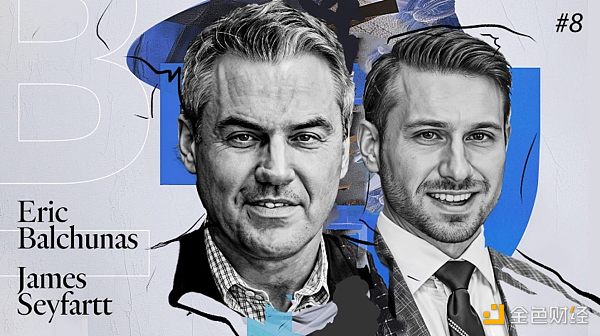
After many years, spot Bitcoin ETFs finally launched, breaking all previous volume records for ETF launches. And spot ETH ETFs may be approved in May.
Even if spot ETH ETFs are rejected (unlikely), Eric and James will still find themselves in the spotlight, and spot ETH ETFs will be resubmitted time and time again until they are approved.
As the cryptocurrency industry market cap surpasses $2 trillion and is expected to reach around $10 trillion in the next cycle, more and more assets will become interesting targets for TradFi (traditional finance) ETF applications. What comes after ETH? I don't know, but I can be sure that Eric and James will always have some insightful viewpoints.
Even if more ETFs don't appear in this market cycle, it's okay. They will eventually appear. Cryptocurrencies represent the birth of a new asset class, and currently only one type of asset has an ETF.
If you follow Eric and James on Twitter, it's clear that they have been influenced by crypto culture. It's a one-way street. They are now one of us.
9. Co-founder of Variant Fund, Li Jin
Co-founder of Variant Fund, passionate pioneer, labor force re-creator, contemplative expresser, warm injector into cold code.

Cryptocurrencies are a failure unless they have a substantial impact on global culture. Cryptocurrency culture is distinctly different from other cultures on the internet. Gradually, everything touched by cryptocurrencies will be influenced by the cryptocurrency culture we create, for better or for worse.
Li Jin is on the "better" side of that. As cryptocurrencies elevate in their products and influence, they will begin to have a more substantial psychological and cultural impact on those walking on their tracks. "If you adopt cryptographic protocols, then you adopt cryptographic values."
Mainstream crypto products will be cultural products—we see this on friend.tech! Low-cost data availability, modular blockchains, and parallel virtual machines are great, but these investment themes are aimed at isolated communities. We need to discover new cultural elements to bring crypto products to the other 5 billion internet users.
Li Jin focuses on consumer crypto products, which is why I am also paying attention to what Li Jin is focused on.
10. Founder of Blockworks, Mike Ippolito
Founder of Blockworks, author of many podcasts, swimmer under the waves, down-to-earth thought mender.
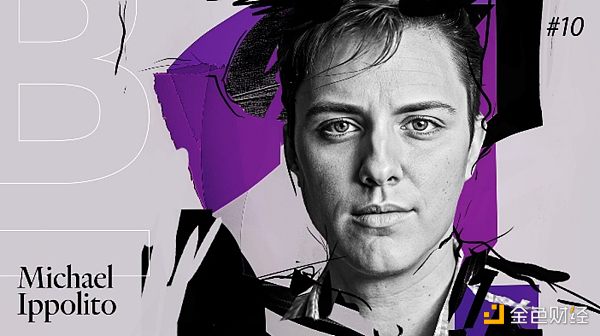
Every time I talk to Mike, I learn something new. Unlocking a new perspective, or there are some nascent ideas stirring. Thank goodness he has his own podcast. His blog is technical and research-oriented, very advanced, and well worth your time. Mike has some kind of tribal immunity gene that gives him a neutral viewpoint.
His company Blockworks has become my preferred source of crypto news. Crypto news is tough, and Blockworks has struck a perfect balance between journalistic integrity and crypto alignment.
11. Founder of The Daily Gwei, Anthony Sassano
Founder of The Daily Gwei, creator of infinite possibilities, professional amateur node operator, humble ETH bull.
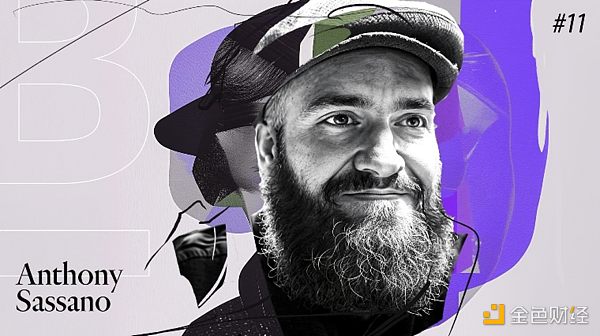
Anthony is in a category of his own. When I say "people worth watching in 2024," I'm more referring to Anthony Sassano and The Daily Gwei. The Daily Gwei is my first stop on the Ethereum journey. If you listen to The Daily Gwei every day, you've graduated from crypto university.
Anthony's carefully curated Daily Gwei discord is a fortress for well-informed, technically savvy Ethereum investors and enthusiasts.
12. Co-founders of The Too Online Podcast, Deana Burke and Natasha Hoskins
Co-founders of the Boys Club podcast, dynamic duo, builders of the world, resonant sharers and expressers, forever grounded dreamers.

One of my recent favorite new podcasts is The Too Online, hosted by Boys Club co-founders Natasha Hoskins and Deana Burke.
Natasha and Deana are crypto natives creating internet-themed content for people. In The Too Online, they each tell a story from the internet that happened last week. The stories are usually not about cryptocurrencies, but they are always content that crypto natives can appreciate, because we are all online too.
After listening to over ten hours of crypto podcasts intensively every week, their light and lively 30-minute internet gossip breathes fresh air into me and reminds me that about 99% of society doesn't care about native crypto topics.
免责声明:本文章仅代表作者个人观点,不代表本平台的立场和观点。本文章仅供信息分享,不构成对任何人的任何投资建议。用户与作者之间的任何争议,与本平台无关。如网页中刊载的文章或图片涉及侵权,请提供相关的权利证明和身份证明发送邮件到support@aicoin.com,本平台相关工作人员将会进行核查。



